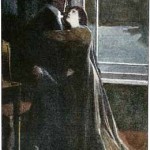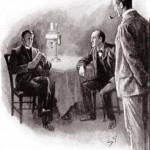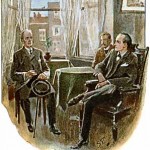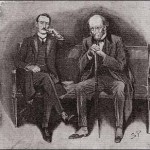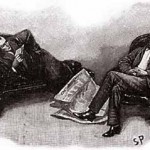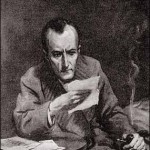” ‘We have judged it best that you should come late. It is to recompense you for any inconvenience that we are paying to you, a young and unknown man, a fee which would buy an opinion from the very heads of your profession. Still, of course, if you would like to draw out of the business, there is plenty of time to do so.’
“I thought of the fifty guineas, and of how very useful they would be to me. ‘Not at all,’ said I, ‘I shall be very happy to accommodate myself to your wishes. I should like, however, to understand a little more clearly what it is that you wish me to do.’
” ‘Quite so. It is very natural that the pledge of secrecy which we have exacted from you should have aroused your curiosity. I have no wish to commit you to anything without your having it all laid before you. I suppose that we are absolutely safe from eavesdroppers?’
” ‘Entirely.’
” ‘Then the matter stands thus. You are probably aware that fuller’s-earth is a valuable product, and that it is only found in one or two places in England?’
” ‘I have heard so.’
” ‘Some little time ago I bought a small place — a very small place — within ten miles of Reading. I was fortunate enough to discover that there was a deposit of fuller’s-earth in one of my fields. On examining it, however, I found that this deposit was a comparatively small one, and that it formed a link between two very much larger ones upon the right and left — both of them, however, in the grounds of my neighbours. These good people were absolutely ignorant that their land contained that which was quite as valuable as a gold-mine. Naturally, it was to my interest to buy their land before they discovered its true value, but unfortunately I had no capital by which I could do this. I took a few of my friends into the secret, however, and they suggested that we should quietly and secretly work our own little deposit and that in this way we should earn the money which would enable us to buy the neighbouring fields. This we have now been doing for some time, and in order to help us in our operations we erected a hydraulic press. This press, as I have already explained, has got out of order, and we wish your advice upon the subject. We guard our secret very jealously, however, and if it once became known that we had hydraulic engineers coming to our little house, it would soon rouse inquiry, and then, if the facts came out, it would be good-bye to any chance of getting these fields and carrying out our plans. That is why I have made you promise me that you will not tell a human being that you are going to Eyford to-night. I hope that I make it all plain?’
” ‘I quite follow you,’ said I. ‘The only point which I could not quite understand was what use you could make of a hydraulic press in excavating fuller’s-earth, which, as I understand, is dug out like gravel from a pit.’
” ‘Ah!’ said he carelessly, ‘we have our own process. We compress the earth into bricks, so as to remove them without revealing what they are. But that is a mere detail. I have taken you fully into my confidence now, Mr. Hatherley, and I have shown you how I trust you.’ He rose as he spoke. ‘I shall expect you, then, at Eyford at 11:15.’
” ‘I shall certainly be there.’
” ‘And not a word to a soul.’ He looked at me with a last long, questioning gaze, and then, pressing my hand in a cold, dank grasp, he hurried from the room.
“Well, when I came to think it all over in cool blood I was very much astonished, as you may both think, at this sudden commission which had been intrusted to me. On the one hand, of course, I was glad, for the fee was at least tenfold what I should have asked had I set a price upon my own services, and it was possible that this order might lead to other ones. On the other hand, the face and manner of my patron had made an unpleasant impression upon me, and I could not think that his explanation of the fuller’s-earth was sufficient to explain the necessity for my coming at midnight, and his extreme anxiety lest I should tell anyone of my errand. However, I threw all fears to the winds, ate a hearty supper, drove to Paddington, and started off, having obeyed to the letter the injunction as to holding my tongue.
“At Reading I had to change not only my carriage but my station. However, I was in time for the last train to Eyford, and I reached the little dim-lit station aher eleven o’clock. I was the only passenger who got out there, and there was no one upon the platform save a single sleepy porter with a lantern. As I passed out through the wicket gate, however, I found my acquaintance of the morning waiting in the shadow upon the other side. Without a word he grasped my arm and hurried me into a carriage, the door of which was standing open. He drew up the windows on either side, tapped on the wood-work, and away we went as fast as the horse could go.”
“One horse?” interjected Holmes.
“Yes, only one.”
“Did you observe the colour?”
“Yes, I saw it by the side-lights when I was stepping into the carriage. It was a chestnut.”
“Tired-looking or fresh?”
“Oh, fresh and glossy.”
“Thank you. I am sorry to have interrupted you. Pray continue your most interesting statement.”
“Away we went then, and we drove for at least an hour. Colonel Lysander Stark had said that it was only seven miles, but I should think, from the rate that we seemed to go, and from the time that we took, that it must have been nearer twelve. He sat at my side in silence all the time, and I was aware, more than once when I glanced in his direction, that he was looking at me with great intensity. The country roads seem to be not very good in that part of the world, for we lurched and jolted terribly. I tried to look out of the windows to see something of where we were, but they were made of frosted glass, and I could make out nothing save the occasional bright blur of a passing light. Now and then I hazarded some remark to break the monotony of the journey, but the colonel answered only in monosyllables, and the conversation soon flagged. At last, however, the bumping of the road was exchanged for the crisp smoothness of a gravel-drive, and the carriage came to a stand. Colonel Lysander Stark sprang out, and, as I followed after him, pulled me swiftly into a porch which gaped in front of us. We stepped, as it were, right out of the carriage and into the hall, so that I failed to catch the most fleeting glance of the front of the house. The instant that I had crossed the threshold the door slammed heavily behind us, and I heard faintly the rattle of the wheels as the carriage drove away.
“It was pitch dark inside the house, and the colonel fumbled about looking for matches and muttering under his breath. Suddenly a door opened at the other end of the passage, and a long, golden bar of light shot out in our direction. It grew broader, and a woman appeared with a lamp in her hand, which she held above her head, pushing her face forward and peering at us. I could see that she was pretty, and from the gloss with which the light shone upon her dark dress I knew that it was a rich material. She spoke a few words in a foreign tongue in a tone as though asking a question, and when my companion answered in a gruff monosyllable she gave such a start that the lamp nearly fell from her hand. Colonel Stark went up to her, whispered something in her ear, and then, pushing her back into the room from whence she had come, he walked towards me again with the lamp in his hand.
” ‘Perhaps you will have the kindness to wait in this room for a few minutes,’ said he, throwing open another door. It was a quiet, little, plainly furnished room, with a round table in the centre, on which several German books were scattered. Colonel Stark laid down the lamp on the top of a harmonium beside the door. ‘I shall not keep you waiting an instant,’ said he, and vanished into the darkness.
“I glanced at the books upon the table, and in spite of my ignorance of German I could see that two of them were treatises on science, the others being volumes of poetry. Then I walked across to the window, hoping that I might catch some glimpse of the country-side, but an oak shutter, heavily barred, was folded across it. It was a wonderfully silent house. There was an old clock ticking loudly somewhere in the passage, but otherwise everything was deadly still. A vague feeling of uneasiness began to steal over me. Who were these German people, and what were they doing living in this strange, out-of-the-way place? And where was the place? I was ten miles or so from Eyford, that was all I knew, but whether north, south, east, or west I had no idea. For that matter, Reading, and possibly other large towns, were within that radius, so the place might not be so secluded, after all. Yet it was quite certain, from the absolute stillness, that we were in the country. I paced up and down the room, humming a tune under my breath to keep up my spirits and feeling that I was thoroughly earning my fifty-guinea fee.
“Suddenly, without any preliminary sound in the midst of the utter stillness, the door of my room swung slowly open. The woman was standing in the aperture, the darkness of the hall behind her, the yellow light from my lamp beating upon her eager and beautiful face. I could see at a glance that she was sick with fear, and the sight sent a chill to my own heart. She held up one shaking finger to warn me to be silent, and she shot a few whispered words of broken English at me, her eyes glancing back, like those of a frightened horse, into the gloom behind her.
” ‘I would go,’ said she, trying hard, as it seemed to me, to speak calmly; ‘I would go. I should not stay here. There is no good for you to do.’
” ‘But, madam,’ said I, ‘I have not yet done what I came for. I cannot possibly leave until I have seen the machine.’
” ‘It is not worth your while to wait,’ she went on. ‘You can pass through the door; no one hinders.’ And then, seeing that I smiled and shook my head, she suddenly threw aside her con- straint and made a step forward, with her hands wrung together. ‘For the love of Heaven!’ she whispered, ‘get away from here before it is too late!’
“But I am somewhat headstrong by nature, and the more ready to engage in an affair when there is some obstacle in the way. I thought of my fifty-guinea fee, of my wearisome journey, and of the unpleasant night which seemed to be before me. Was it all to go for nothing? Why should I slink away without having carried out my commission, and without the payment which was my due? This woman might, for all I knew, be a monomaniac. With a stout bearing, therefore, though her manner had shaken me more than I cared to confess, I still shook my head and declared my intention of remaining where I was. She was about to renew her entreaties when a door slammed overhead, and the sound of several footsteps was heard upon the stairs. She listened for an instant, threw up her hands with a despairing gesture, and vanished as suddenly and as noiselessly as she had come.
“The newcomers were Colonel Lysander Stark and a short thick man with a chinchilla beard growing out of the creases of his double chin, who was introduced to me as Mr. Ferguson.
” ‘This is my secretary and manager,’ said the colonel. ‘By the way, I was under the impression that I left this door shut just now. I fear that you have felt the draught.’
” ‘On the contrary,’ said I, ‘I opened the door myself because I felt the room to be a little close.’
“He shot one of his suspicious looks at me. ‘Perhaps we had better proceed to business, then,’ said he. ‘Mr. Ferguson and I will take you up to see the machine.’
” ‘I had better put my hat on, I suppose.’
” ‘Oh, no, it is in the house.’
” ‘What, you dig fuller’s-earth in the house?’
” ‘No, no. This is only where we compress it. But never mind that. All we wish you to do is to examine the machine and to let us know what is wrong with it.’
“We went upstairs together, the colonel first with the lamp, the fat manager and I behind him. It was a labyrinth of an old house, with corridors, passages, narrow winding staircases, and little low doors, the thresholds of which were hollowed out by the generations who had crossed them. There were no carpets and no signs of any furniture above the ground floor, while the plaster was peeling off the walls, and the damp was breaking through in green, unhealthy blotches. I tried to put on as uncon- cerned an air as possible, but I had not forgotten the warnings of the lady, even though I disregarded them, and I kept a keen eye upon my two companions. Ferguson appeared to be a morose and silent man, but I could see from the little that he said that he was at least a fellow-countryman.
“Colonel Lysander Stark stopped at last before a low door, which he unlocked. Within was a small, square room, in which the three of us could hardly get at one time. Ferguson remained outside, and the colonel ushered me in.
” ‘We are now,’ said he, ‘actually within the hydraulic press, and it would be a particularly unpleasant thing for us if anyone were to turn it on. The ceiling of this small chamber is really the end of the descending piston, and it comes down with the force of many tons upon this metal floor. There are small lateral columns of water outside which receive the force, and which transmit and multiply it in the manner which is familiar to you. The machine goes readily enough, but there is some stiffness in the working of it, and it has lost a little of its force. Perhaps you will have the goodness to look it over and to show us how we can set it right.’

